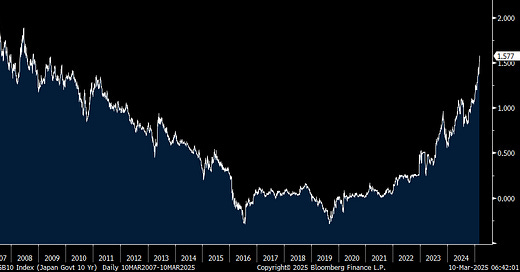He forgot to mention all that fiscal largess/Will the pain lead to longer term gains?/JGB yields continue higher/Other
To a question on Friday about why the US economy has done so well over the past few years compared to its international peers, Jay Powell mentioned everything except the exceptional amount of fiscal government spending. He cited the pick up in productivity, our structural benefits of a rule of law, culture of innovation and deep capital markets. He also talked about the influx of immigrants in 2022 and 2023. All true but either he forgot to mention the fiscal largess or didn't want to wade into that but either way, it's got to be a topic of monetary policy discussion next week and thereafter because if we lose that fiscal juice, the US economy is going to lose a key pillar of economic support. Again, trimming the size of the government footprint in the economy is a good thing to the benefit of the private sector long term but in the short term, no lunch is free.
It's not just the US farmer that today is getting hit with Chinese tariffs on beef, chicken, grains and other things, China decided to slap tariffs on some Canadian ag imports including a 100% one on rapeseed oil/meal and peas along with 25% on pork and others. That is in retaliation to the Canadian tariffs put on Chinese EVs and steel and aluminum that Canada announced late last year. Will there really be a long-term gain from all of this as we are told with the sacrifice of some short-term pain?
Back to Jay Powell, I know some think that rate cuts will save the economic day as they did in 2019 when the Fed was cutting in response to the manufacturing recession brought on by tariffs but what if long term rates don't fall and rise instead with more rate cuts as they did after the September cuts and have clearly done in Europe last week after another ECB rate cut.
The BoJ meets next week again and those always secretive 'people familiar with the matter' said "Bank of Japan officials are leaning toward keeping interest rates unchanged this month after their hike in January and as growing uncertainties in the global economy require close attention" according to a Bloomberg story on Friday.
That didn't stop the 10 yr JGB yield from rising by another 6 bps overnight to 1.58%, the highest since October 2008. This move comes after base pay in Japan in January rose 3.1% y/o/y, up from 2.6% in December and that is the quickest pace of gain since 1992.
Keep reading with a 7-day free trial
Subscribe to The Boock Report to keep reading this post and get 7 days of free access to the full post archives.



